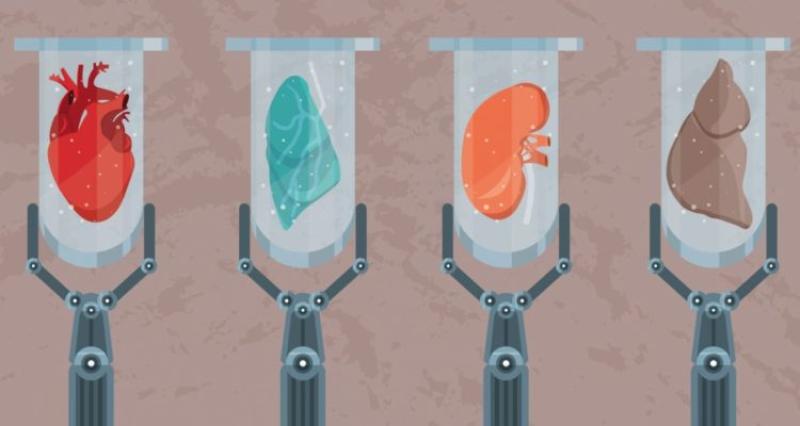Israeli scientists invent unrejectable organs



Israeli scientists invent unrejectable organs
By Israel21c, reported by World Israel News, November 19, 2018

Regenerative medicine (Illustrative/Valentina Kru via Shutterstock)
Breakthrough development uses a patient’s own stomach cells, cutting the risk of an immune response to implanted organs.
Israeli researchers report that they have invented the first fully personalized tissue implant, engineered from a patient’s own materials and cells. The new technology makes it possible to engineer any kind of tissue implant, for the spinal cord, to the heart, or brain, from one small fatty tissue biopsy.
“We were able to create a personalized hydrogel from the materials of the biopsy, to differentiate fatty tissue cells into different cell types and to engineer cardiac, spinal cord, cortical and other tissue implants to treat different diseases,” said lead researcher Prof. Tal Dvir of Tel Aviv University’s Center for Nanoscience and Nanotechnology and Sagol Center for Regenerative Biotechnology.
“Since both the cells and the material used derive from the patient, the implant does not provoke an immune response, ensuring proper regeneration of the defected organ,” Dvir explained.
The research was conducted by Dvir’s postdoctoral researcher, Reuven Edri, and doctoral students Nadav Noor and Idan Gal, in collaboration with Prof. Dan Peer and Prof. Irit Gat Viks of TAU’s Department of Cell Research and Immunology and Prof. Lior Heller of Assaf HaRofeh Medical Center in Israel. It was recently published in the journal Advanced Materials.
Avoiding anti-rejection drugs
Currently, in tissue engineering for regenerative medicine, cells are isolated from the patient and cultured in biomaterials to assemble into a functional tissue. These biomaterials can be synthetic or natural, derived from plants or animals.
After transplantation, they may induce an immune response that leads to rejection of the implanted tissue. Patients receiving engineered tissues or any other implants are treated with immuno-suppressors, which unfortunately can endanger the health of the patient.
The new method solves that problem.
“With our technology, we can engineer any tissue type, and after transplantation we can efficiently regenerate any diseased or injured organ — a heart after a heart attack, a brain after trauma or with Parkinson’s disease, a spinal cord after injury,” said Dvir.
“In addition, we can engineer adipogenic [fatty tissue] implants for reconstructive surgeries or cosmetics. These implants will not be rejected by the body.”
The researchers extracted a small biopsy of fatty tissue from patients, then separated its cellular and a-cellular materials. While the cells were reprogrammed to become induced pluripotent stem cells — able to make cells from all three basic body layers, so they can potentially produce any cell or tissue the body needs to repair itself — the extracellular material was processed to become a personalized hydrogel.
After combining the resulting stem cells and the hydrogel, the scientists successfully engineered the personalized tissue samples and tested the patients’ immune responses to them.
The researchers are currently engaged in regenerating an injured spinal cord and an infarcted heart with spinal-cord and cardiac implants. They have also begun to investigate the potential of human dopaminergic implants to treat Parkinson’s disease in animal models.
The researchers plan to regenerate other organs, including intestines and eyes, using the patients’ own materials and cells.
“We believe that the technology of engineering fully personalized tissue implants of any type will allow us to regenerate any organ with a minimal risk of immune response,” Dvir said.
 Article is LOCKED by author/seeder
Article is LOCKED by author/seeder

Another day, another fantastic medical or technological or agricultural breakthrough by Israeli scientists.
The only problem is that this procedure will be prohibitively expensive for all except the very rich and affluent for a long time to come. Not to mention the long wait in the U.S. until it becomes approved by the medical community here. Bottom line is that the common people are out of luck for the foreseeable future. The above being said, that does not take away from a potential incredible medical breakthrough.
My concern is that the technique could be used to create a Frankenstein's monster.
What's wrong with that, let the rich foot the bill for more research to make it easier to do and less expensive, because eventually with the financial input from the rich the process will be more affordable for everyone else.
As for the long wait, I wonder what the laws are that would control this, for they are using your own stem cells which is your own property to control not the govt's and since what is produced is your own cells (which is why the possibility of rejection is eliminated) you don't have to pay for someone else's patent like what may be required for embryonic cells, which may also require anti-rejection drugs.
Unfortunately it's too late for Steve "Superman" Reeves, who campaigned for stem cell research.
I think you mean Christopher Reeve, Buzz.
Lol I was wondering who Steve Reeves was (maybe it was a mental mashup of Stephen Hawking and Christopher Reeve)
So nothing unusual then.
Still this is another marvel of modern technology
New technologies and associated products are always expensive initially. But at least it's now there. But it will become cheaper and more readily available over time.
Brains????
That would be amazing, but then we'd have to figure out how to transfer the data from the old one (or would we? mwah ha ha ha)
Transferring the "data" was my first thought. But I wouldn't mind a whole new brain, a clean slate!
Hmmm maybe but I'd definitely want to retain some memories/behaviours. For example potty training or eating seem important:)
Buzz,
This article is from an unsourced site. I am going to close it and you may reopen it when you find the story from a mainstream paper.